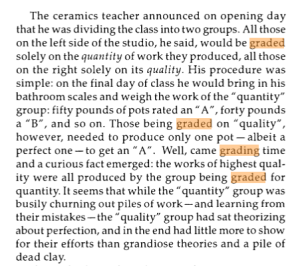
Recently one of my sons was going through a discouraging patch of inspiration in regards to the building up of his talent. In addition to my fatherly soft-and-tough pep talk about persevering and not giving up, I also repeated back a parable I had heard which also made complete sense to him – and brought a smile back to his face. That story was the Parable of the Pottery Makers as it originally was told in the book “Art and Fear” and relayed in the book “The First 20 Hours.”
This particular son, who is the most perfectionist of all my children, will tend to research and analyze the details of a new skill to the point that he becomes paralyzed by feelings of inadequacy and as a result never gets started actually practicing what he has learned. This is is why I recommend that in the beginning, as a parent, you shield your child from too much outside scrutiny so that he isn’t frozen into inaction. Encourage your child to get his hands dirty as soon as possible and to stumble (safely) through as quickly as possible in order to break beyond the first baby-step problems that a newbie has to go through.
Click my Amazon affiliate link below to get your copy of “Art and Fear”:
Art & Fear







